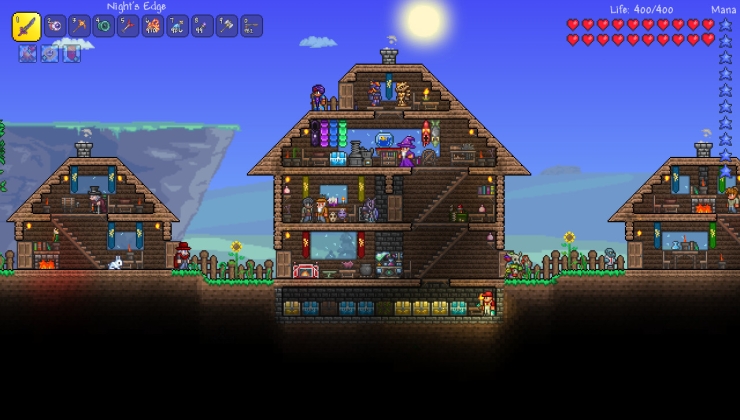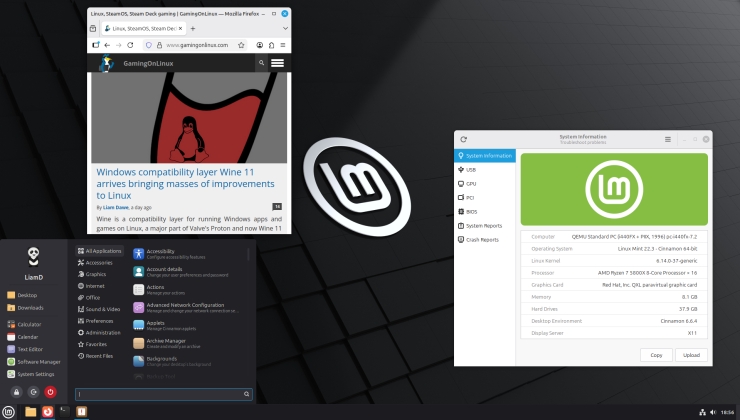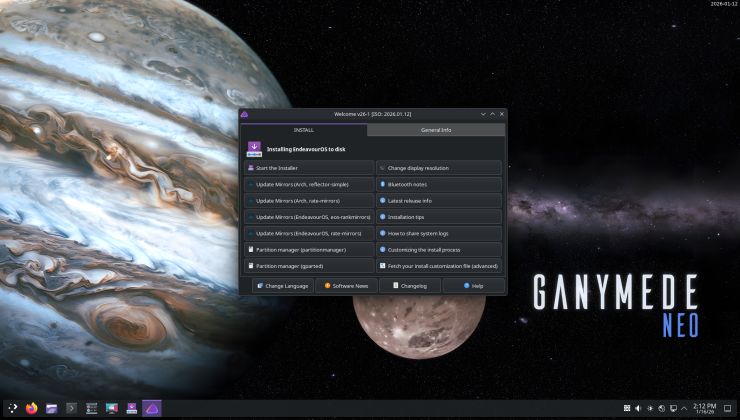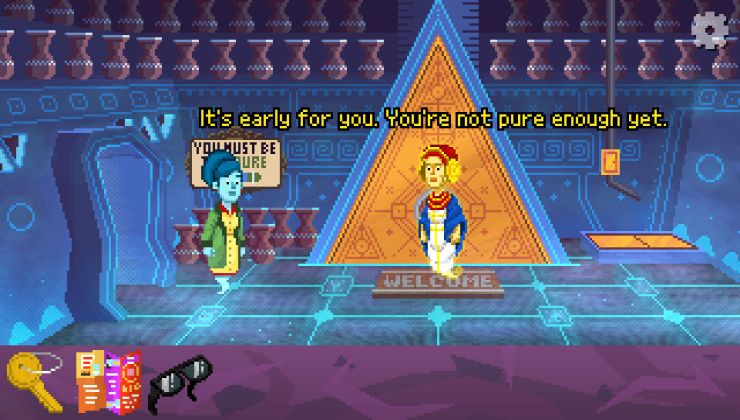Frozenbyte being the developer behind titles like the Trine series, Shadwen, Has-Been Heroes and the upcoming Starbase talks a little about Proton and future native Linux support. If you're not clear on what Proton and Steam Play are, be sure to check out our constantly updated dedicated page. It's a special compatibility layer for running Windows games and apps from Steam on Linux.
If you're not aware, Frozenbyte did previously have their games ported over to Linux but they eventually stopped after the release of Shadwen in 2016. The latest Trine 4 and their other titles don't have Linux version. With Starbase that's due to release tomorrow (July 29, 2021), there's a post on the Steam forum from a user asking about Linux support and Frozenbyte developer Jukka Larja (JLarja) replied on July 27 to explain it's not a priority:
With Proton being as good as it is, native support is not very high on our list. In fact (without actually trying the native versions on modern Linux distro) I would recommend Proton emulation over native versions for all the previous games we've released. Changes are you'll get better graphics quality, likely less trouble getting the game running and input working, and possible better performance too. For low-on-resources port Proton is simply superior.
If Linux gaming takes off (for example, because Steam Deck becomes a huge success), then we'll have a reason to consider not-so-low-on-resources port, which may (and probably does) change the picture somewhat. At the moment we have Xbox Series X/S higher on our porting targets list though (not for Starbase currently, but for other future projects).
I imagine there will be plenty more of this, especially for older ports where performance wasn't top and some that might have other issues. Proton isn't just something that's good to ensure Linux gamers and Steam Deck users get to play the latest games, it's also (as even porter Ethan Lee has pointed out), good for being an "essential preservation project" for older Windows games to keep them working nicely.
What is interesting to see is a mention of it being possibility if the Steam Deck is a success. People will argue on one side about there not being a point if Proton gets to the stage where Windows games can just run out of the box on Linux with Proton, but there is the other side that a native Linux build gives developers more control and flexibility on their games compared with handing it all over to Valve. Either way, that and more depends on how the Steam Deck goes.
Guess I don't buy anything from them except maybe when there are -80% discounts.
https://steamcommunity.com/app/454120/discussions/0/3074251201336025249/#c3056240606700591926
We prefer to save money by selling games without support at all.
In both cases, one (devs or users) is loosing money (but its not sure for the native port, the benefit just may be not enought).
We may think that it's not very bad if the game is working flawlessly, but nothing garantee it (and nothing garantee that devs are testing their game under Proton), and when you buy a game, you buy support too, but not in this case...
I don't know what to think about this...
I just see that some devs wants to benefit for Steam Deck announcement (because nothing has changed, they already dont make linux ports anymore).
I don't see it as interesting, but as marketting.
Last edited by DebianUser on 28 Jul 2021 at 4:01 pm UTC
If Linux gaming takes off (for example, because Steam Deck becomes a huge success), then we'll have a reason to consider not-so-low-on-resources portInteresting point, which I've considered in the past. That's definitely a possibility. I can at least see game devs, in order:
- Revisiting old titles to add support for Steam Controller APIs
- Testing against Proton like No Man's Sky seems to do (were they aware of the deck?) and providing support for it
- Integrating natively with DXVK like portal does
- Providing native builds targeting the pressure vessel runtime and better tuning for the deck (think march=native)
- Moving to another cross-platform API for their next games
Any one of these points would be a win, and current porters can probably help with all of them, especially the native build.
OK, now two more thoughts:
- is it possible to override a builtin DXVK version like we can with SDL? [I'm going to ask that on GitHub.](https://github.com/Joshua-Ashton/dxvk-native/issues/6)
- A friend of mine is looking into Linux distros. I think SteamOS 3.0 might fill a gap when it comes to well-supported desktop OSes. I can't really recommend Debian/Ubuntu because graphics drivers (and generally software) tends to not be upgraded often, plus it's hardly the best showcase of Linux tech (though it works and is generally stable, but a bit hard to fix). Nix feels a bit too alien to recommend. Arch needs a deep dive. Manjaro... is so full of hacks it makes me uncomfortable. Fedora might be a pain to get help for, though silverblue is interesting. SteamOS 3.0 might strike a good balance between Arch and Ubuntu, depending on how they handle software updates for the desktop part. Will this be the OS for Linux on the desktop? :P
Last edited by MayeulC on 28 Jul 2021 at 5:40 pm UTC
Quoting: HoriI'd rather have working Proton "version", than buggy/broken native versions.I think that I read these types of comments many years ago when Cedega was a popular application.
In fact, there are already games in my library which I play with Proton even though they have a native version.
I'd also rather have devs spend the time making sure their game works well with Proton rather than wasting it on an underfunded Linux version that's doomed to fail.
I'd also rather have a Proton "version" than none at all. (which is probably the case in the case here, as discontinued/unsupported ports don't count)
Either do a good, proper, well-supported Linux version, or none at all and use Proton instead. That's my take on this matter. Obviously the first is the better option for the end-user, but until there's enough demand, it not worth it for a lot of devs out there.
PS: Ain't nobody gonna complain about them saying "Proton emulation"?
Back then, most of these users moved back to Windows because that is the best platform to play games for Windows.
Personally, I prefer buggy Linux ports of games to nothing, which means games for Windows using Proton.
People complain about the quality of games on Steam. However, I remember that I was happy when Icculus ported Medal of Honor and Serious sam the second edition to Linux - beta versions.
If the game is playable on Linux that's great even if I have to use some tricks to run it.
Devastation for Linux was doomed to fail, and you shouldn't forget this one game - but I still bought a version for Windows to run it. Compare Devastation for Linux to any other game on Steam, you will see the difference, which is the better option for you.
Quoting: gradyvuckovicThat part in the quotes tells you everything you need to know.The fact that they did not bother to fix sound issues in "Shadowgrounds: Survivor" (the sound subsystem would just crash after 10 minutes making entire game mute) and just told Linux players GTFO has told me everything I should know about Frozenbyte.
Speaking of which, I've tried to run "Shadowgrounds: Survivor" two months ago on a modern system. Guess what? It worked! After the usual "padsp" trick in order to emulate ALSA for this piece of game. So… What "game preservation" are we talking about? I do not see a problem, let alone think dependency on closed-source proprietary and ever-shifting WIN32 API (which even Microsoft is trying to bury) would "preserve" anything.
P.S. "Just Use Proton" strikes again! Another bookmark in my "Just Use Proton" collection. :)
Quoting: GuestActually their statement is worse in my opinion: native or not, no support at all for running their games on GNU/Linux by any means. I doubt anyone can take a platform seriously if there's no support for it.I think they simply don't have Linux developers. So you should read their statement as "we'll hire some if Steam Deck will be a success". I suspect someone else did Stadia work for them.
A depressing statement. Not that Trine3 ever ran (at all) for me, but Trine and Trine2 were great.
What makes this even worse is that Trine 4 is on Stadia.
Quoting: KohlyKohlThey were hesitant to port over Trine 3 and didn't bother with Trine 4. This is not a surprise by any means.Is it coincidence that I didn't bother to buy their unported games. Nope.
Quoting: GuestI doubt anyone can take a platform seriously if there's no support for it.Inversely, I can't take a game company seriously if they don't officially support their game on my platform.
Their game goes straight to the bottom of the list, a list of tens of thousands of games I might add making them undistinguished.
Quoting: GuestWhat makes this even worse is that Trine 4 is on Stadia.I wonder if the people in charge are technically minded enough to understand that Stadia is Linux. After the shitstorm that happened at Activation-Blizzard this week with people being perpetually drunk for 6 months, my dystopian vision of "how bad", "how disorganized" and "complete chaos" was vastly a under-prediction of the potential incompetence within even "big AAA" "respectable" companies.
All the AAA simping and white knighting of why AAA games can't support Linux cuz "tem not has enough li nuks mons 4 coleg" is completely dashed to pieces by what we saw at Activision+Blizzard. No wonder their catalog has been absolute trash for the last few years.
Quoting: ShmerlI think they simply don't have Linux developers.I think Ethan Lee and others are looking for new jobs. Just saying.
Quoting: 1xokI think Ethan Lee and others are looking for new jobs. Just saying.I don't think they should look at Frozenbyte then. I suppose making their own games is an option too if they want to stay in the gaming industry that is.
Last edited by Shmerl on 28 Jul 2021 at 5:02 pm UTC
Proton is a net gain for gaming on Linux, but I don't think it is a stretch to say that in most cases Proton currently remains off-label use for games (that is to say, in most cases its use isn't currently officially supported), and that porters have been impacted to some degree (to be clear, I'm not suggesting Proton disincentivized Frozenbyte from providing Linux ports of their last few games, it's clear that is not the case). With Valve supporting the games it whitelists instead of the IP owners who oversee the source code (unless something has changed in that regard), and many, if not most, gamers willing to buy games irrespective of whether the developers support Linux, I'm not sure I see enough incentive for change to the support status quo in an industry where "underdeliver" often seems to be the mantra.
Quoting: ElectricPrismAll the AAA simping and white knighting of why AAA games can't support Linux cuz "tem not has enough li nuks mons 4 coleg" is completely dashed to pieces by what we saw at Activision+Blizzard. No wonder their catalog has been absolute trash for the last few years.Holy Bacon! I went and looked this up--what a bunch of complete vicious incompetent assholes.
Quoting: MohandevirI'm no specialist, but from what I read, there is also the possibility of optimizing the code for the Steam Deck to get that extra performance, in a native build, that you can't get with Proton. Am I wrong to think so?No, that is true. If we look at the Shadow of Tomb Raider port, the native version is more performant than the Proton version.
Just by removing the wine overhead, you should see a performance increase, but then again it varies by game, since there were games that saw a performance boost on Linux with Proton
Quoting: Guest3k open issues on proton github say otherwise...They don't typically close issues, even when the issue is fixed, to keep discussion open.
Quoting: GuestOf course, 3k open issues on proton github say otherwise...You know there's a compatibility report for every single game that someone's tested in Proton, right? A new issue, every one.
Quoting: GuestI don't understand why you guys are bashing frozenbyte for not bothering to "support" proton. That's exactly the same situation of every other game on the steamdeck, no support at all from developers and publishers.And those games simply aren't worth very much.
Let's have some axioms that even the most cash-strapped developer will agree are true.
Axiom 1:
Spoiler, click me
This sets a floor. If your game doesn't even work in Proton, it's worth exactly £0.00.
Axiom 2:
Spoiler, click me
compared to
Before release a dev sees that an update doesn't work on one of their test targets and fixes it
One of these things is much more valuable than the other.
This starts to show a scale of value for the developer keeping their game working. If a developer makes sure that it will continue to work, that is more valuable than if they don't, and the price should reflect that.
Axiom 3:
Spoiler, click me
The developer tells you to go stick your head in a pig.
or
The developer doesn't tell you to go stick your head in a pig.
One of these things is much more valuable than the other.
Here we see the value of having recourse. A game where the developer announces on the Store page that my platform is supported, and the requirements of that support, gives me recourse should the developer fail to deliver: I have something that I can point to when getting the refund that shows that they have specifically broken their commitment. That has value.
And, good news for developers: it's really easy to get money from me. All you have to do is
- Make a game I want to play for the platform I play games on
- Use your whole arse
Do those and I'll pay you with a smile on my face. So that establishes a ceiling: a fully-supported game is worth 100%. For others, their circumstances mean that their ceiling will be lower, but the hierarchy of value is the same.
And, hey, more good news: testing your game on as many different platforms as you can; different environments, different compilers, different schedulers and memory managers, all of that - lets you find bugs easier, faster, and more cheaply, for all of your platforms, even if you never make a single Linux sale.
For me, the tiers work out as
Doesn't work at all: 0%
Accidentally works in Proton: 10%
Deliberately works in Proton: 50%
Deliberately works on Linux: 100%
Others may be more generous, or less so.
There we have a sliding scale that gives more value to the game developer in exchange for the greater value they provide to the customer. More Tux, more bucks.
Now, just me applying the sliding scale to my purchases probably isn't going to make that much difference to a developer. Even if every Linux gamer applied the same scale, it might not make that much difference. A lot of developers are perfectly content to be at the blunt end of "no Tux, no bucks." If everyone that bought a Deck applied the scale, though, maybe that would demonstrate the correct market signals for them.
Last edited by CatKiller on 28 Jul 2021 at 8:06 pm UTC
They can use different names for it like Wine, WineX, Cedega, Cider, and so on.
I saw a lot of corporations and small indie developers that constantly try this experiment, and they always lose when they make games in this way.
You can't create a better emulator than the current version of Windows, and Microsoft doesn't have to do anything to prove it. It takes some time when individuals are going to accept it sooner or later.
Last edited by gbudny on 28 Jul 2021 at 8:40 pm UTC
Quoting: CatKillerNice one! Should be considering the "online game" criteria. I wouldn't pay a dime for an online game that works accidentally through Proton. Those games are way to prone to breakage after an update, which are way too frequent. The developers must at least officially support Proton, in those cases.Quoting: GuestI don't understand why you guys are bashing frozenbyte for not bothering to "support" proton. That's exactly the same situation of every other game on the steamdeck, no support at all from developers and publishers.And those games simply aren't worth very much.
Let's have some axioms that even the most cash-strapped developer will agree are true.
Axiom 1:
Spoiler, click me
A game that doesn't work at all is worth absolutely nothing. It's not worth possessing, even if they give it away for free.
This sets a floor. If your game doesn't even work in Proton, it's worth exactly £0.00.
Axiom 2:
Spoiler, click me
IF someone reports the bug to Valve, and IF Valve go through the effort of determining the cause, and IF they can persuade the developers to fix their game... eventually they might provide a fix
compared to
Before release a dev sees that an update doesn't work on one of their test targets and fixes it
One of these things is much more valuable than the other.
This starts to show a scale of value for the developer keeping their game working. If a developer makes sure that it will continue to work, that is more valuable than if they don't, and the price should reflect that.
Axiom 3:
Spoiler, click me
The game has some kind of problem, and you contact the developer about it.
The developer tells you to go stick your head in a pig.
or
The developer doesn't tell you to go stick your head in a pig.
One of these things is much more valuable than the other.
Here we see the value of having recourse. A game where the developer announces on the Store page that my platform is supported, and the requirements of that support, gives me recourse should the developer fail to deliver: I have something that I can point to when getting the refund that shows that they have specifically broken their commitment. That has value.
And, good news for developers: it's really easy to get money from me. All you have to do is
- Make a game I want to play for the platform I play games on
- Use your whole arse
Do those and I'll pay you with a smile on my face. So that establishes a ceiling: a fully-supported game is worth 100%. For others, their circumstances mean that their ceiling will be lower, but the hierarchy of value is the same.
And, hey, more good news: testing your game on as many different platforms as you can; different environments, different compilers, different schedulers and memory managers, all of that - lets you find bugs easier, faster, and more cheaply, for all of your platforms, even if you never make a single Linux sale.
For me, the tiers work out as
Doesn't work at all: 0%
Accidentally works in Proton: 10%
Deliberately works in Proton: 50%
Deliberately works on Linux: 100%
Others may be more generous, or less so.
There we have a sliding scale that gives more value to the game developer in exchange for the greater value they provide to the customer. More Tux, more bucks.
Now, just me applying the sliding scale to my purchases probably isn't going to make that much difference to a developer. Even if every Linux gamer applied the same scale, it might not make that much difference. A lot of developers are perfectly content to be at the blunt end of "no Tux, no bucks." If everyone that bought a Deck applied the scale, though, maybe that would demonstrate the correct market signals for them.
Quoting: MohandevirNice one! Should be considering the "online game" criteria. I wouldn't pay a dime for an online game that works accidentally through Proton. Those games are way to prone to breakage after an update, which are way too frequent. The developers must at least officially support Proton, in those cases.Well, that's the dilemma, isn't it? Can you squeeze £6 worth of value out of a £60 game before they break it? On the bright side, by the time a game gets to 90% off they've often stopped making breaking changes.












 How to setup OpenMW for modern Morrowind on Linux / SteamOS and Steam Deck
How to setup OpenMW for modern Morrowind on Linux / SteamOS and Steam Deck How to install Hollow Knight: Silksong mods on Linux, SteamOS and Steam Deck
How to install Hollow Knight: Silksong mods on Linux, SteamOS and Steam Deck